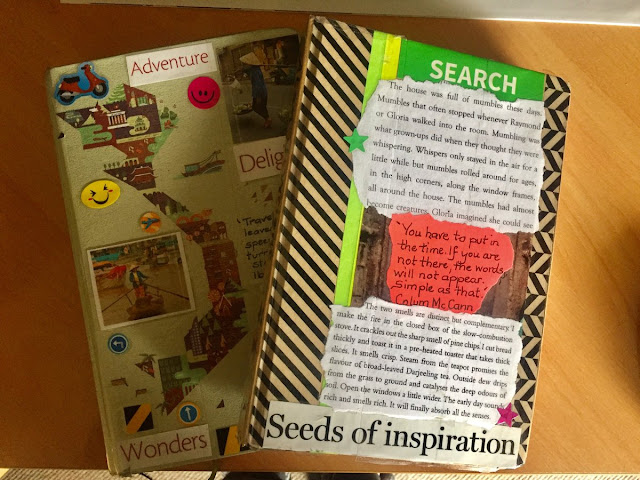The Writer's Notebook-Helping Me Teach Writing More Effectively
As a writer, you surely deserve a place to record your reactions to the daily events in the world that surrounds you. Developing your own writer’s notebook is the ideal way to demonstrate your commitment to a writing kind of life. In this special book of your own choosing you are able to show your students how you react to the world; record your thoughts, your wonderings and harvest your ideas. There might also be lists (names, places), anecdotes and words. Phrases and short descriptions of people, places and events may also be used to trigger a memory for more in depth writing at a later time. Hopefully your notebook will also become a place where you collect artifacts such as maps, photographs, drawings, news articles and the like, -anything that sparks your thinking as a writer. The notebook contains many beginnings, and from those beginnings longer writing pieces will hopefully emerge.
This notebook needs to be readily accessible to you and your students. Hopefully, in time it will become an indispensable component of the writing teacher’s life.
Each writer’s notebook I commence becomes an extension of me. It travels with me, -always accessible in case it’s needed. I consciously write in a variety of settings- some quiet by choice, others noisy and active by choice. - Cafes, planes, trains, classrooms, parks, my study –writing has the potential to happen, basically anywhere. It is important that student writers enjoy this same level of freedom when it comes to their writing. It would be sad if they grew to only associate writing in a notebook as something you did for a teacher at school.
Writing in the notebook also needs to demonstrate the writer’s willingness to write across a range of genres. Finding authentic purposes for writing is the first step and then a decision needs to be made as to what form the writing needs to take. Ask yourself, how do writers normally write about this subject/topic/idea?
For an increasing number of teachers, embracing the writer’s notebook is seen as a logical first step in developing a more effective writing program in the classroom. A greater issue for many is where do I begin, and how do I sustain the energy and ideas?
Starting Out With Your Own Writer’s Notebook!
Questions often arise around the types of entries one might gather when starting out with a writer’s notebook- entries that will serve as examples to share with students. I am not a great fan of prompts, but if you are having trouble getting inspiration, maybe these ideas might prompt your thinking’ around what to write.
Hopefully, you will be encouraged you to think of a connection to a topic/idea you feel strongly about. Most importantly, I urge you to dive straight in and start filling your notebook pages with your special words.
‘I begin to clip and capture observations from my life. The pages of my notebook begins to fill with collected artefacts and memories. I know these harvested items have much potential to feed my writing. In time they will sustain my teaching of writing. I just have to be ready to receive them.’
From: Igniting Writing-When a Teacher Writes, Alan j Wright, Hawker Brownlow Education
Here are some suggestions to stir your writing life into action. Don't feel compelled to use them if you have your own urgent possibilities. Go with them by all means. Your own writing is such a powerful model for your students. I urge you to take the leap forward...
• Write about the first book you remember reading
• Create a Life Map to show events in your life so far
• Write an entry about one of the items on your Life Map.
• Write an entry over any topic of your choosing. Write about your personal opinion
• Write a response to a book you are currently reading
• Write about the meaning behind a treasured object - what memories do you associate with that object?
• Create a plan for a memoir piece
• Write a memoir including all the sensory details and what you discovered about yourself from that slice of life experience
• Make a list of your personal choosing. E.g. Things that take too much time
• Persuasive Writing - Choose an issue that is important to you, and write an opinion piece
• Respond to an issue in the news
• Write a short narrative about being sick as a child
• Write about a place you would go right now and why
• Write about something that was no fun at all
• Make a list of things you wish to do in the future
• Write about a time when you knew you were in trouble
• How did you spend your pocket money?
• Write from magazine headlines that spark a connection
• Write about an embarrassing moment
• Write about your relationship with weekends
• Write a list about things you don’t need
• Write about noise
• Write about silence
• Write about pretending
• Make a list of questions you wished you had asked
• Write about your feet
• Write about your treasures
• Write about something you wish you could still do
• Write and DRAW about a place that is important to you
• Create a map of a place you recall from your childhood
Writing ideas come to me because I am constantly seeking them out. The more I use my ears, my eyes, my brain and my heart, the greater the store of ideas I have to select from. Ideas create an energy source that is self sustaining. My writer’s notebook never goes hungry. My teaching of writing is the beneficiary.








Comments
Post a Comment